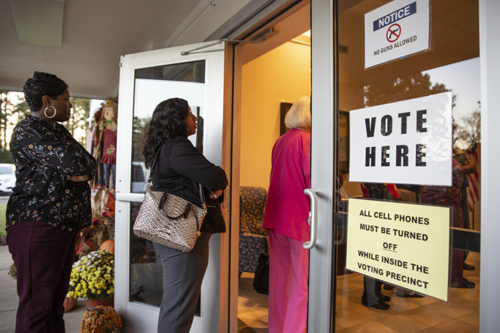
By Bobby Harrison,
Mississippi Today,

The number of locations to vote in states and jurisdictions with a history of minority voter suppression has been reduced by at least 1,173 since 2013, according to a study by the Leadership Conference Education Fund.
The reduction comes, the report finds, after the U.S. Supreme Court in June 2013 struck down a portion of the Voting Rights Act of 1964 that required those jurisdictions to obtain federal Department of Justice approval to make changes to their elections.
The Education Fund determined the number of closed polling places by surveying 757 of the 861 counties covered by the Voting Right Act. The study did not compile information from the counties where it could not garner accurate information.
The segment of the national report that focused on Mississippi found the number of poll closures at 98, which closely coincided with the totals found by Mississippi Today in 2018 before the November mid-term elections.
The Education Fund, a research arm of the Leadership Conference on Civil and Human Rights, based on its report, is urging for congressional passage of the Voting Rights Advancement Act to, among other things, restore the need for federal approval of elections changes in states like Mississippi that have a history of voter discrimination. The Supreme Court left open the possibility of Congress restoring the need for federal approval if the preclearance was based on updated data.
The Voting Rights Advancement Act would update the original Voting Rights Act to require federal approval for jurisdictions with more recent history of discrimination. Under the bill, states with 15 or more voting rights violations within the past 25 years or 10 or more if one of the violations was enacted by a state would be covered. Under the proposal Mississippi still would be covered.
“Next to the ballot itself, the most identifiable element of our democracy’s voting process is the polling place. It should – and it must – be accessible to all. When it is not, the barriers to participation can be high. Moving or closing a polling place – particularly without notice or input from communities – disrupts our democracy,” said the report, titled Democracy Diverted, which was released Tuesday.
Leigh Chapman, program director for voting rights at the Education Fund, said the closures of the voting locations come at a time voter turnout is increasing, potentially leading to long lines at polling places.
“Long lines can lead to voter disenfranchisement,” she said during a recent telephone interview. “Some people are not able to stand in long lines.”
The report found 750 polling places closed in Texas since the Supreme Court ruling, 320 in Arizona and 214 in Georgia.
The national report conceded that there are legitimate reasons to close polling places, such as population loss, but said it appears in some instances no legitimate reasons were provided for closing polling places.
In many instances, Chapman said officials cited non compliance with American with Disabilities Act guidelines as the reason for closing polling places. But she said national standards provide temporary modifications to make polling places compliant with ADA guidelines, such as temporary ramps.
In addition, in Mississippi the law allows for poll workers to deliver a ballot to a vehicle in the parking lot for a voter who might have difficulties accessing a polling place because of physical limitations. In law, it is referred to as curbside voting.
When the Supreme Court struck down the section of the Voting Rights Act requiring preclearance of election changes, Mississippi’s Republican leadership praised the ruling.
“This chapter is closed,” Secretary of State Delbert Hosemann, whose office oversees state election laws, said when the Supreme Court ruling was released. “Mississippi citizens have earned the right to determine our voting processes.”
When the ruling was made Hosemann was in the process of enacting a law requiring citizens to display a government-issued photo identification to vote. The ruling meant federal approval was not needed to enact the law.
Under the original Voting Rights Act of 1964, all election changes in nine states, predominantly located in the South and jurisdictions in six other states, had to obtain federal approval of election changes. The proposed new law would cover 11 states.
According to the report, the original Voting Rights Act had an overwhelming impact on increasing African-American voter participation. In Mississippi, for instance, 5 percent of black citizens were registered prior to the enactment of the Voting Rights Act. The state of Mississippi, before the Voting Rights Act, used a litany of methods to prevent blacks from voting, such as poll taxes and outright intimidation.
Mississippi voters can find out where to cast their ballot in the upcoming November election using the Secretary of State’s polling place locator.

Be the first to comment